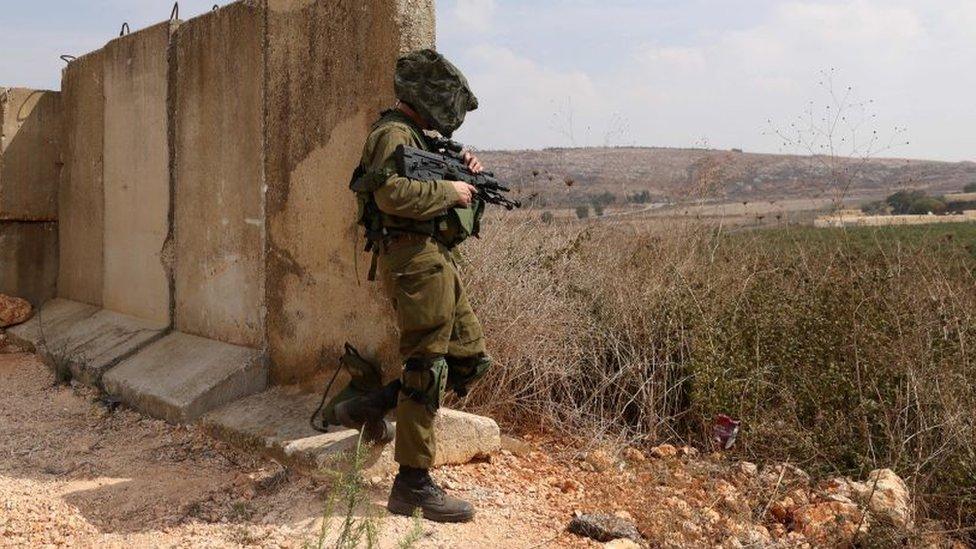Iraq could be pushed into conflict, minister warns
- Published
'They are not going to solve their problem on Iraqi soil'
Iraq could be pushed into conflict by tit-for-tat attacks on its territory by Iranian-backed militias and US forces, Iraqi foreign minister, Dr Fuad Hussein, has told the BBC.
"The tension nowadays between Iran and the United States is very high," he said.
"I hope both sides will stop their attacks. They are not going to solve their problem on Iraqi soil," he said. "We paid a very big price."
In the past week or so, that price has involved a wave of US air strikes killing 17 fighters from Iranian-backed armed groups. Then came a deadly missile attack on a militia commander, Abu Bakir Al Saadi, which turned his jeep into a fireball on a residential street in Baghdad. That attack was condemned by the government here as "a clear-cut assassination" without regard for civilian lives or international law - a stunning indictment of an ally.
The American strikes were in retaliation for the killing of three US soldiers in Jordan. The US military says it will "continue to take necessary action" to protect its own people.
As the two sides battle it out, Iraq is getting burnt.
The minister said talks had to resume on the withdrawal of 2,500 US troops, deployed here as advisors since 2014 to help prevent a resurgence of the so-called Islamic State. The word - in government and on the streets - is that they have overstayed their welcome.
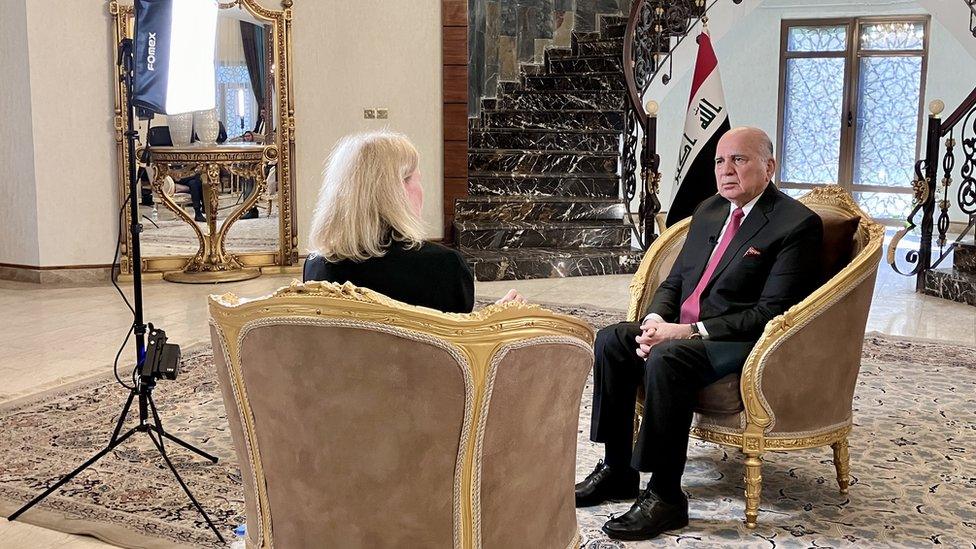
Foreign Minister Dr Fuad Hussein says the US and Iran are not going to solve their problems in Iraq
"The majority of Iraqi people do not want to have foreign forces on Iraqi soil," he told us. "Those who have been invited (the Americans), we will do it through negotiation. And those who have not been invited must leave, we hope also through negotiation."
The uninvited guests - at least not invited by him - are powerful pro-Iranian militias here who have been targeting US troops. Officially, many are part of Iraq's security forces. Critics say they are foot soldiers for Iran.
The minister says the militias are now being challenged, a change from the past when speaking out meant threats. This is a new moment in Iraq.
"If now you talk with many political leaders, they're starting to talk about this," he said. "Many people, they didn't dare to talk about it. This is also part of the reality of this country. But now we are talking about it. People dare to say to those guys, 'it's enough'."
And he says the militias have got the message that "if they continue, they will push this country into a war while it is not our war". The message has also been received in Tehran, he says.
The foreign minister admits that Iran has "influence" here, but denies it is dictating policy in Baghdad. It is more of "a constant negotiation", according to Dr Renad Mansour, a senior research fellow at Chatham House, an international affairs think tank in London.
"Do they have to listen to Tehran? Sometimes yes, and sometimes no," he says. "It depends. The Iranians come in and say 'this is our bottom line, this is our red line'. Often, they converge, but sometimes they diverge. It's not as black and white."
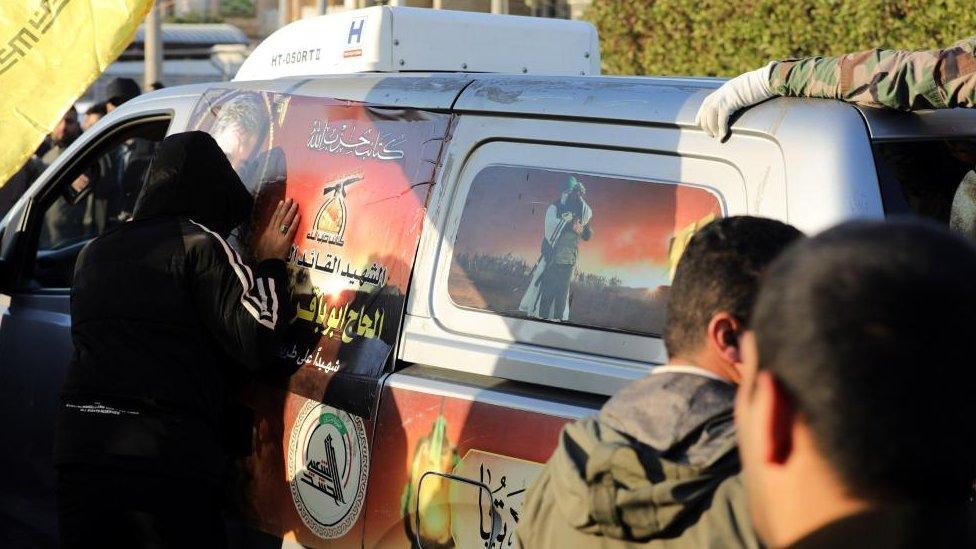
A senior commander of an Iranian-backed militia was killed in a US drone strike in Baghdad
The Iranian influence looms large here: in politics, in militias, and in the streets. Among the blast walls and the palms trees, you find posters of Qasem Soleimani, the top Iranian general killed at Baghdad airport in January 2020 by a US airstrike. Here and there the face of Iran's supreme leader, Ayatollah Ali Khamenei, gazes down on choking traffic.
Some of the tuk-tuk taxis screeching around Tahrir Square in the afternoon sun have pictures of Sheikh Hassan Nasrallah, the Iranian-backed leader of Hezbollah, the most powerful armed force in Lebanon.
I asked the foreign minister if he was worried about the degree of Iranian influence here. "I'm worried about the degree of all the influence surrounding us, not only Iranian. We are trying to get rid of all these influences. The decision about Iraq must be taken in Baghdad, and it must be taken by the Iraqis in Baghdad," he said.
For now, the country is ensnared between its two feuding allies: Iran and the US. Neither may want a major escalation in their conflict - and it appears they do not - but it cannot be ruled out.
Pro-Iranian armed groups here have vowed to step up their attacks on US forces, after the killing of the militia commander in Baghdad. "His assassination… violated all rules of engagement," said a statement from the Islamic Resistance of Iraq. "We call on our brothers in jihad to join the ranks of the resistance… to expel the occupation."
The situation remains volatile, according to the United Nations envoy for Iraq, Jeanine Hennis-Plasschaert. "Iraq - indeed, the wider region - remain on a knife-edge," she says, "with the tiniest miscalculation threatening a major conflagration.
Related topics
- Published3 February 2024
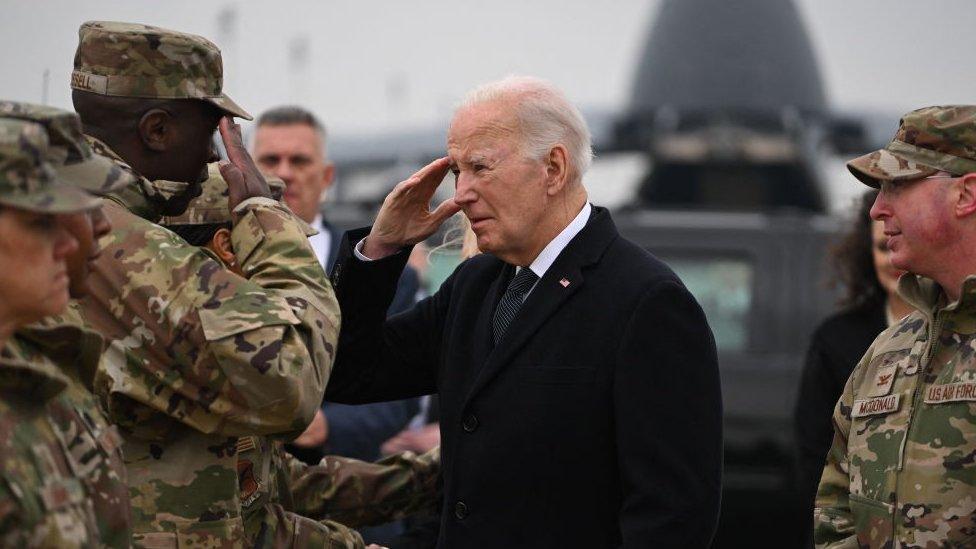
- Published20 January 2024
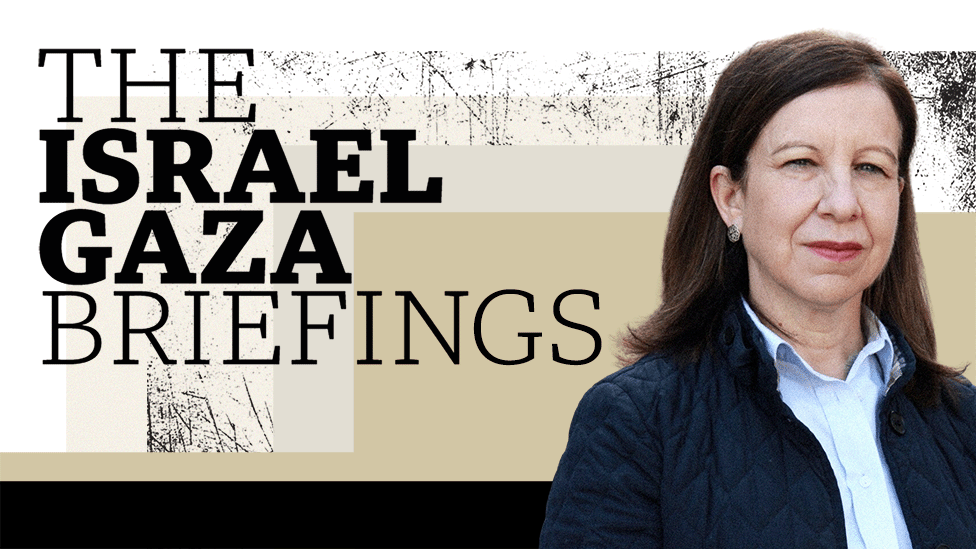
- Published8 February 2024
